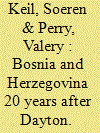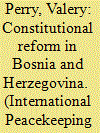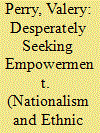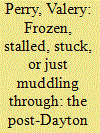|
|
|
Sort Order |
|
|
|
Items / Page
|
|
|
|
|
|
|
| Srl | Item |
| 1 |
ID:
142273


|
|
|
|
|
| Summary/Abstract |
It has been 20 years since the Dayton Peace Agreement (DPA, official name: General Framework Agreement for Peace in Bosnia and Herzegovina) ended the bloodiest war in Europe since World War II. The violent conflict and the peace agreement demonstrated many of the tectonic changes that Europe and the world as a whole went through after the end of the Cold War. First, the wars highlighted the inability of the European Community (after 1993 European Union (EU)) to end the conflict, because of its Member States' disagreement on strategies and options, including the threat of military intervention, and the brilliant recognition and manipulation of this wavering by Balkan leaders. Reflecting this European discord, the DPA secondly highlighted the importance of the United States as the only remaining superpower capable of decisively intervening to end the violence in Southeastern Europe. The perception of a weak EU and a strong US willing to use military force would be further strengthened when NATO, significantly led by the US, intervened in the Kosovo war in 1999. Third, the war, and the consequent peace agreement also highlighted that the end of the Cold War by no means resulted in an end of violent conflict in Europe and beyond. Francis Fukuyama's thesis of the “End of History” and the victory of capitalism and democracy proved to be wrong, shortly after it was formulated. Finally, the war in Bosnia and the resulting peace agreement raised new discussions about the drivers of political violence and conflict, the role of ethnicity in democratic systems and institutional options available to overcome such wars and build and consolidate democracies.
|
|
|
|
|
|
|
|
|
|
|
|
|
|
|
|
| 2 |
ID:
142275


|
|
|
|
|
| Summary/Abstract |
This article considers Bosnia and Herzegovina (BiH)'s constitutional reform path options following the 20-year anniversary of the Dayton Agreement that ended the war. The need for substantive structural and constitutional reform has not gone away, and there is an open question on whether and how Euro-Atlantic integration processes might influence reform outcomes. First, a brief review of constitutional reform efforts to date is presented. Second, arguments for and against constitutional reform in BiH are summarized. Next, some characteristics of federal and confederal systems are introduced to frame discussions on BiH decision-making capabilities, and the role of the state vs lower levels of government. This includes a discussion on the issue of a BiH ‘coordination mechanism’ to manage EU integration, and whether or not the state might need some sort of supremacy clause. The article closes with some musings on the apparent trajectory of the country. The case of BiH is not sui generis, and can contribute to the literature and potentially influence policy-makers interested in the implementation and possible re-negotiation of peace treaties and constitutions – issues relevant to any countries emerging from divisive, violent conflict.
|
|
|
|
|
|
|
|
|
|
|
|
|
|
|
|
| 3 |
ID:
179901


|
|
|
|
|
| Summary/Abstract |
This article introduces this special section on the topic of gender and extremism/violent extremism in the Western Balkans. The author argues that this topic is best understood as a social phenomenon and an example of political violence. She briefly introduces some relevant concepts before summarizing the four articles in the collection, and then notes common over-arching themes.
|
|
|
|
|
|
|
|
|
|
|
|
|
|
|
|
| 4 |
ID:
163167


|
|
|
|
|
| Summary/Abstract |
The war in Bosnia and Herzegovina (BiH) ended in 1995, yet the state remains crippled by inertia, escalating political infighting, and domestic and regional rhetoric that undermines efforts at community, social, and political reconciliation. The author argues that BiH can be categorized as a frozen conflict, as the core issues at the heart of the violent conflict of the 1990s have not been resolved. BiH is an interesting case study as the nature of today’s frozen conflict was to a large extent shaped by the very peace agreement that ended the war, which effectively ended the war yet failed to either address the drivers of conflict, or to establish political and structural mechanisms that would help to mediate and govern the country. Following brief historical background, Ludvik and Smetana’s offered subtypes are applied, with various scenarios proposed to illustrate key characteristics. The conclusion argues that no conflict transformation has occurred over the past 20+ years, and the structure of the conflict itself has begun to change over a generation of destructive stasis.
|
|
|
|
|
|
|
|
|
|
|
|
|
|
|
|
|
|
|
|
|